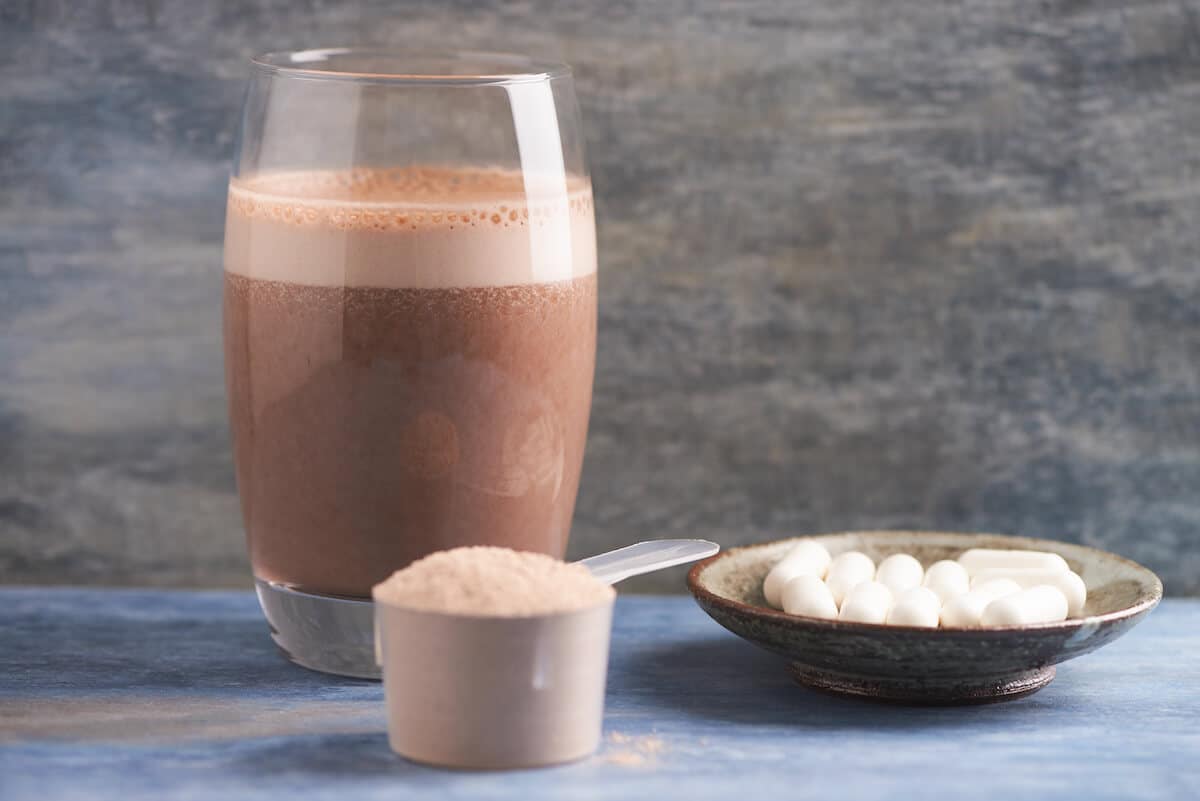
21 Sep Leucine Supplement: Potential Benefits and Considerations
If you’ve been involved in athletics or bodybuilding for any length of time, a sports nutrition expert or even a workout partner may have recommended adding a leucine supplement to your daily routine. The question is: Do you really need to supplement with leucine? And how is it different from isoleucine?
Let’s explore what leucine is, its benefits and why you might need it. (Note: It might not be right for everyone.)
What Is Leucine?
Leucine is one of three branched-chain amino acids (BCAAs) — the other two are isoleucine and valine. Named because of the branched side chain in their molecular structure, BCAAs are essential amino acids (EAAs). This means your body can’t make them, so you need to get them from your nutrition, especially your protein intake.
What Are Amino Acids?
Amino acids are the basic building blocks of protein. When you consume dietary protein, your digestive system breaks it down into amino acids, including leucine. These amino acids are then recombined into other proteins in a process called “protein synthesis.”
Your body uses those “recombined proteins” to build your entire physical structure — including your cells, organs, bones, muscles, skin, nails, and hair — as well as to produce enzymes and hormones, manage your immune system, and fuel your body, among other critical functions.
Benefits of Leucine

As an important BCAA, leucine has many vital functions within your body. Let’s look at some of the benefits it can provide.
Leucine for Building and Maintaining Muscle
All the BCAAs are necessary for building skeletal muscle and helping muscles recover after intense exercise, but leucine is the most critical. It’s the amino acid primarily responsible for the activation of mTor, the protein that induces muscle protein synthesis. Without leucine, not only would you have no muscle, you would have no physical body. Leucine combined with strength training helps to build lean mass, which is important for general health and well-being, and especially important for athletes and bodybuilders.
In addition, leucine helps to reduce the opposite process of muscle protein breakdown. This happens when your body doesn’t have access to enough energy — for example, during intense exercise — and therefore starts to break down muscle so it can use the glycogen stored there.
Muscle mass is also important when it comes to healthcare for older adults — muscle loss occurs naturally as we age and we also lose muscle strength. This is known as sarcopenia. Supplementing with BCAAs, particularly leucine, and adding resistance training to your daily routine can go a long way towards counteracting this degenerative process.
Leucine for Managing Body Composition
High-protein diets are often very effective for weight loss (especially when combined with regular exercise), helping you maintain lean muscle while you lose excess adipose tissue (otherwise known as body fat) — and leucine has a critical role in this.
A study published in the Journal of Physiology found that when you’re restricting calories, leucine helps to manage your blood sugar. It also reduces cholesterol and encourages your body to access energy from sources like fat and carbohydrates, rather than using the protein in your muscle tissue. This is particularly important when you’re managing your weight as lean muscle mass helps to burn fat, so ideally you want to avoid losing any.
Is Isoleucine the Same Thing as Leucine?
Leucine is sometimes referred to as L-leucine, but isoleucine is an entirely different amino acid. Leucine and isoleucine are both non-polar (uncharged), aliphatic amino acids. They are structural isomers, which means they have the same molecular formula but slightly different structures, which gives them different physiological properties.
Like leucine, isoleucine also helps with stabilizing blood sugar and muscle growth, but its primary roles are to:
- Stimulate glucose uptake into cells and then translate that into energy
- Help produce red blood cells and hemoglobin, so oxygen can be carried around your body
- Detoxify nitrogenous waste, for example, ammonia, which can then be excreted
- Maintain your immune system
If you take a BCAA dietary supplement or a protein supplement like whey protein, you’ll be getting leucine, isoleucine, and valine. If you’re specifically after the muscle-building effects of leucine though, you may prefer a leucine supplement.
Leucine Supplementation: Is It Necessary?

While research around amino acid supplementation has been around for a while, leucine is probably the most individually studied of the BCAAs (probably because of its importance and high oxidation rate). Yet there are still discrepancies in what sports nutritionists recommend as a baseline when it comes to doses of leucine.
For example, the World Health Organization recommends 39 milligrams of leucine per kilogram of body weight and research published in the Journal of Nutrition indicates that the average person needs at least 40 milligrams. Another study published on PubMed recommends 55 milligrams for healthy young adult men, and athletes and others involved in intensive training may require as much as 2-3 grams per meal to maximize protein synthesis.
More research is definitely needed, but there’s no doubt that ingestion of enough leucine is critical for your health.
Where to Get Leucine

Moderately active, healthy adults should be able to get enough leucine from regular meals, as long as they include carbohydrates, fats, and protein in their daily dietary intake. While leucine is found in many common foods in the USA, the following have an especially high leucine content:
- Chicken
- Beef
- Pork
- Fish, like salmon or tuna
- Eggs
- Legumes, such as beans, lentils, chickpeas, and soybeans
- Oats
- Brown rice
- Cottage cheese and yogurt
- Pumpkin, sesame, and hemp seeds
- Cashews, almonds, and Brazil nuts
- Peanuts
However, if you’re a bodybuilder or athlete involved in athletic performance, you’re losing muscle mass due to age or illness, or you’re managing your weight, you may need to increase your intake of leucine.
You might choose a BCAA supplement that includes leucine or you may prefer a leucine supplement on its own. Both are widely available in health stores and online. They come in pill or powder form, and the latter is easily mixed into smoothies, shakes and other meals.
When you’re deciding which supplement to invest in, make sure you choose a high-quality supplement that’s been independently tested. For example, Ingredient Optimized ioBCAA, which contains leucine, has been proven to be more bioavailable than non-optimized BCAAs. (However, there aren’t any ioLeucine supplements currently on the market.)
Considerations When Taking a Leucine Supplement
The jury is still out on some of the side effects of leucine supplementation, but the evidence so far indicates that supplementing with BCAAs, including leucine supplements, might not be a good idea while you’re pregnant or breastfeeding.
You should also stay clear of BCAAs if you have Maple syrup urine disease. This is a rare condition, but those who suffer from it are unable to process some amino acids, which can potentially lead to severe health issues.
Bear in mind that supplementing with high doses of any amino acid alone for a long period of time isn’t recommended as it can put extra strain on your body — especially your kidneys. It can also cause low blood sugar and interfere with your metabolism.
Should You Take a Leucine Supplement?
When it comes to building and maintaining muscle and managing body composition, leucine is the most critical branched-chain amino acid. It stimulates protein synthesis and encourages lean muscle mass, which is crucial both for general health and for athletes and bodybuilders.
As it’s found in many common foods, the average person can probably get enough leucine from their daily diet. If you’re working out intensely though or looking to build lean muscle for health purposes, you may benefit from a leucine supplement. Make sure you choose a high-quality supplement so you’re giving your body the best it can get.


